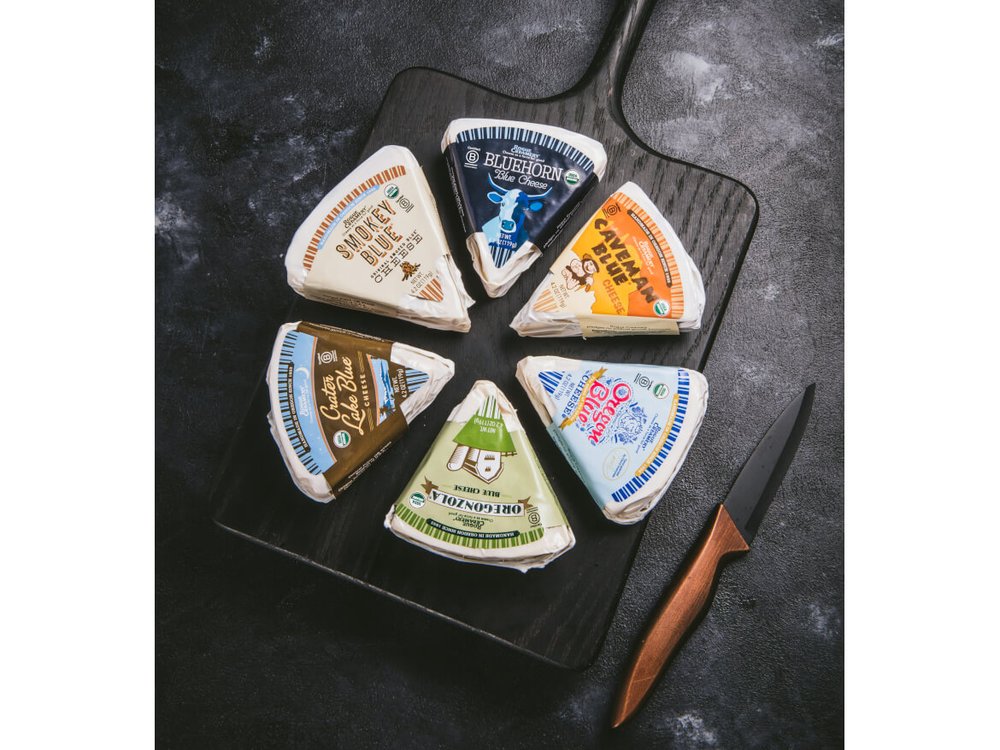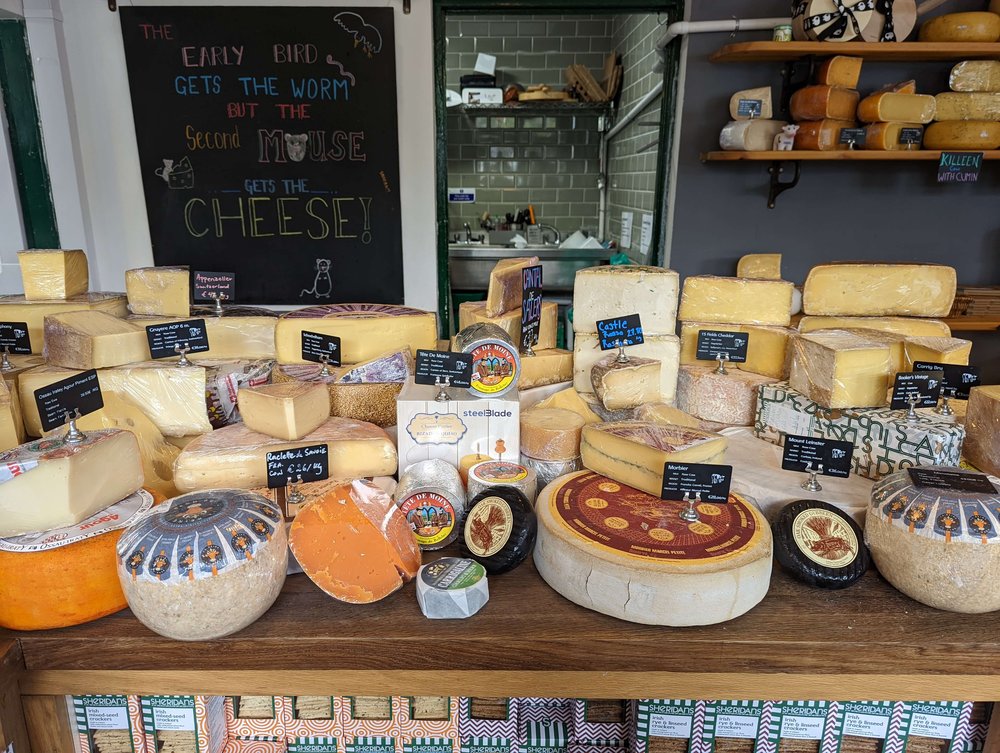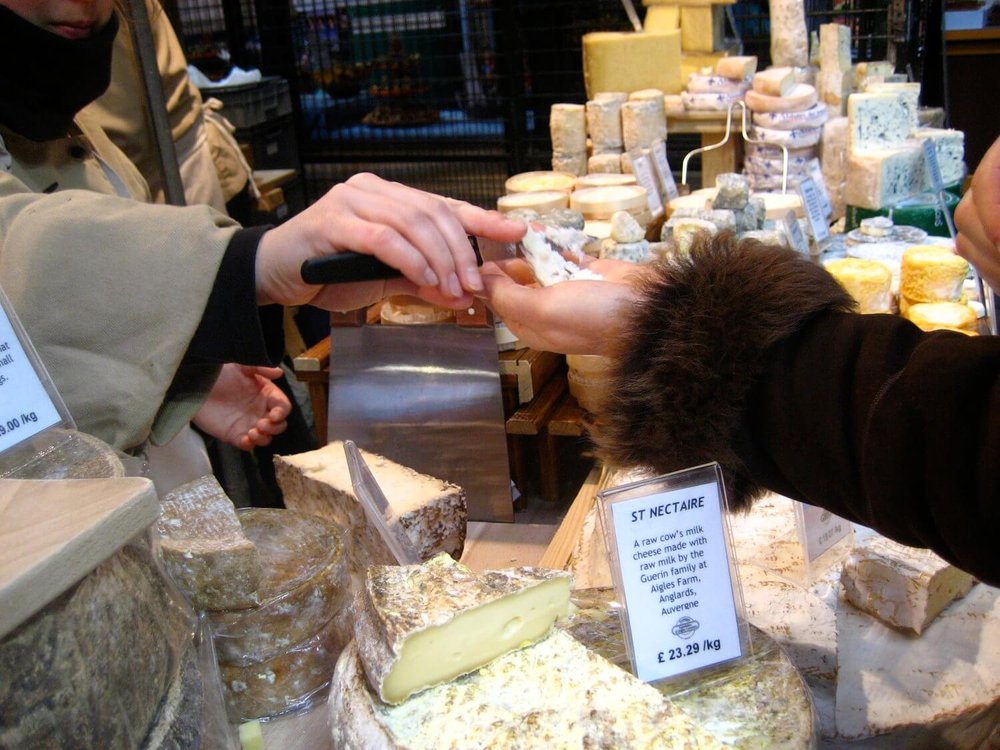Editor’s note: In an ideal world, all cheese would be cut to order. But you don’t need to me to tell you that we don’t live in an ideal world. As more and more artisan producers are offering more pre-cuts, we felt it was time to take a closer look at why and when it makes sense to offer them.

One of my recurrent customers in Galway would always say “about a thumb worth please” as I placed the knife on a wheel of cheddar, and just before I cut, she would say “and a little more.” Years after I left my job behind the counter at Sheridans Cheesemongers, I still remember her and sometimes I even say to my local cheesemonger that I want a “thumb worth” of cheese. Cut-to-order cheese shops are special. A type of store that anchors a neighborhood and sometimes becomes the catalyzer for a whole region. Many cheese makers credit the championing of their products by a local cheese store as key to ensuring their survival. However, cheese shops around the world are struggling. Many are hoping for a good end of the year but will close in early 2023. The current global inflationary pressure is eroding some of the gains made during the pandemic. As I wrote a couple of weeks ago, cheese sampling is still not yet back, and this means that many stores have lost that unique appeal they once had to sample products, and now prices are rising.
Reasons for the Rise of Pre-cuts

Companies like Jasper Hill Farm started a pre-cut program during the pandemic, others like Point Reyes Farmstead Cheese and Rogue Creamery had a small program that was expanded during the pandemic. Cheese producers in Switzerland and Italy continued expanding their sales of precuts and found that in some emerging markets like Asia or Latin America this is the only way to be introduced to consumers. In England, for example, Waitrose Cheese Specialists have all but disappeared in stores, but the cheese case has expanded with more pre-cut options.
Aging & Packaging

But entering the Direct-to-Consumer market is not as easy as just purchasing machinery. There are a lot of other considerations to make. Lynn Giacomini Stray of Point Reyes Farmstead Cheese explains: “Our cheese making has not changed but our packaging department has… We’ve invested in conversion technology to reduce labor in-store so retailers can deliver premium products to high-value shoppers. A cheese maker relies on packaging material much more with a smaller pre-cut piece compared to a bulk wheel. A bulk wheel will continue to age as it is being taken care of by a monger at the right temperature and humidity. A monger can clean it and re-wrap it in the larger format as they continue to cut into it. An exact weight UPC wedge usually has a longer shelf life then a piece cut at a counter. With a longer shelf life, a cheese maker is relying on that packaging to perform…. not break a seal and mold early. A precut can certainly deliver the same quality a cheese maker intends however a lot of attention must go toward the packaging of the smaller pre-cuts.”
Labor & Counter Space

Labor supply issues are often referred to by cut-to-order stores when deciding to bring in pre-cuts. However, there is still a need for supervision of those cheese pieces, otherwise spoilage can happen easily. In a conversation with Emilio Mignucci of Di Bruno Bros in Philadelphia he mentioned that in his stores the pre-cut section continues to grow, and that moving some staples to the grab-and-go section has allowed for more special cheeses to be brought to the counter. His cheesemongers cut pieces of Parmigiano-Reggiano, Manchego and other staples every day or every other day. “We will still cut a piece of PR for you at the counter, but most people prefer to grab that from the pieces already wrapped.” He told me when we spoke on the phone.
Is there a place for pre-cuts in cheese shops? Kurt Mullican of Grey’s Fine Cheeses thinks “Definitely. There’s room for precuts in most shops, unless you are just totally against it. Block Cheddars are a great pre-cut option, as well as cheeses people tend to cook with, like halloumi or feta. If you need a “house” selection of cheeses that people can just grab and go, they make a great option. They also tend to be lower cost too. If you don’t have room for 4 different kinds of Beemster in your fridge- pre-cuts can fill that need for sure.” He and wife Jackie opened their store in May 2021 in Memphis, Tennessee after operating online doing cheeseboards.
Kurt also mentioned that his staff has done a lot of quick learning. “We have a wine director, a server, and 2 chefs in house since we serve food. They have all learned how to cut, wrap and talk cheese in an enthusiastic way over time. I’m the only official one with the title of monger in house, but our whole staff will act as a monger when I’m busy. If things get too hairy or there’s a question they can’t answer, they’ll ask if I can come talk cheese. Maybe It’s not the most scalable model, but the cheese is our product and we are all happily helping it find a good home. As we grow our business, training mongers more formally will become top priority.”
A Hybrid Approach
Some cheese shops have found happy mediums, a clear example is the family of businesses co-owned by Laura Downey of the Fairfield & Greenwich Cheese Company and the Cheesemonger Box in Connecticut. Laura wrote to me that “I think for small specialty shops, cut-to-order is our bread and butter. It differentiates us from larger grocery stores and big box stores. Because we cut each wheel, we know how that particular cheese tastes, we can offer a sample to the customer, and the customer can decide how much they want. As cheesemongers, knowing how cheese tastes and develops and being able to convey that to customers is our superpower. They come here for our expertise and know the cheese is always in tip-top shape. Cheesemonger Box is also successful because people recognize the quality and the difference in flavor from other mail-order cheese.”
Mail Order
Many stores around the US and the UK now have successful mail-order cheese businesses that depend on cheeses being pre-cut. Subscription boxes are also sourcing pre-cut cheeses that can be easily shipped. At the end of the day, Lynn told me: “I believe we will see a mix in the marketplace of pre-cuts and random weight being cut at the counter.”
